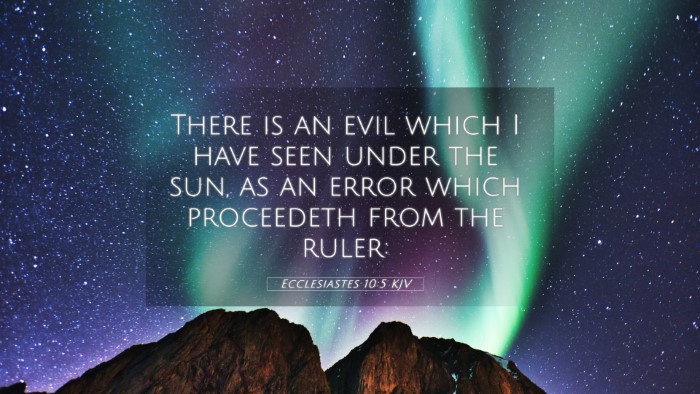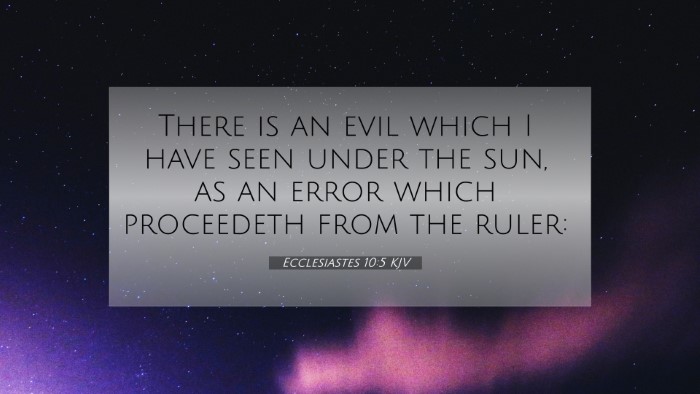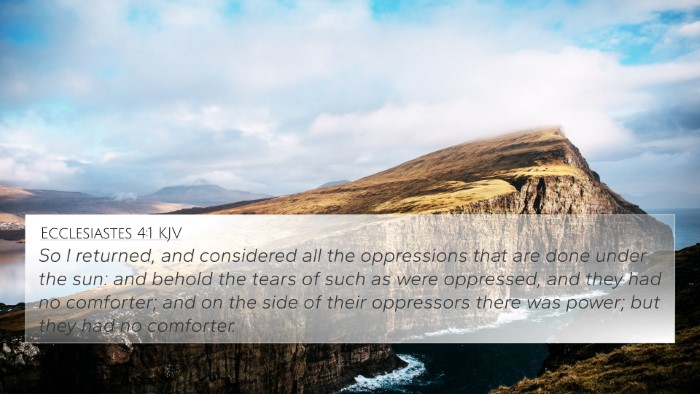Understanding Ecclesiastes 10:5
Ecclesiastes 10:5 states: "There is an evil which I have seen under the sun, as an error which proceedeth from the ruler." This verse presents a stark observation about the nature of authority and governance. Below, we delve into a summary of insights derived from respected public domain commentaries, exploring the deeper meanings and implications of this passage.
Overview of Ecclesiastes
The Book of Ecclesiastes reflects on the meaning of life from the perspective of the Teacher, who often grapples with the apparent futility and unpredictability of human endeavors. Often cited for its reflections on wisdom and the human condition, this particular verse sheds light on the potential pitfalls of leadership and the consequences of poor judgment.
Commentary Insights
-
Matthew Henry:
Henry explains that the verse points to the reality that leadership can be flawed. It highlights an “error from the ruler,” signaling the repercussions of misguided decisions that impact society negatively. Such an observation prompts the reader to consider the weight of responsibility that rests upon leaders, emphasizing that their actions, whether just or unjust, reverberate throughout the community.
-
Albert Barnes:
Barnes elaborates on the “evil” mentioned in the verse, suggesting that it symbolizes the moral and ethical failings of those in power. The error is not merely a personal failing but a systemic one that can lead to widespread consequences. This commentary invites readers to reflect on the nature of authority and justice, particularly how rulers' decisions can deviate from wisdom and right conduct.
-
Adam Clarke:
Clarke emphasizes the phrase “under the sun,” indicating the earthly experiences where human beings witness the injustices inflicted by those in power. He points out that it serves as a cautionary tale, reminding us that even the highest authorities are human and fallible, urging believers to seek divine guidance amidst the frailty of human decision-making.
Thematic Connections
The verse brings to light critical themes relevant to governance and morality, and its implications stretch across various scriptural connections:
-
Proverbs 29:2: "When the righteous are in authority, the people rejoice: but when the wicked beareth rule, the people mourn." This cross-reference solidifies the idea that leadership has profound impacts on society, resonating with the themes established in Ecclesiastes 10:5.
-
Isaiah 3:5: "And the people shall be oppressed, every one by another, and every one by his neighbor: the child shall behave himself proudly against the ancient, and the base against the honorable." This verse correlates with the troubles arising from poor leadership, heightening the warning of errors in judgment.
-
James 3:1: "My brethren, be not many masters, knowing that we shall receive the greater condemnation." This New Testament verse emphasizes the heavy burden of leadership, paralleling the caution expressed in Ecclesiastes regarding rulers.
-
Matthew 23:4: "For they bind heavy burdens and grievous to be borne, and lay them on men's shoulders; but they themselves will not move them with one of their fingers." Here, Jesus highlights the hypocrisy of some leaders, linking this with the central problem of failing governance noted in Ecclesiastes.
-
Psalms 146:3-4: "Put not your trust in princes, nor in the son of man, in whom there is no help. His breath goeth forth, he returneth to his earth; in that very day his thoughts perish." This underscores the transient nature of human authority and the importance of placing faith beyond earthly leaders.
-
1 Samuel 8:10-18: Here, God warns the people of Israel about the implications of choosing a king, paralleling the theme of the consequences of poor leadership in Ecclesiastes.
-
Romans 13:1: "Let every soul be subject unto the higher powers. For there is no power but of God: the powers that be are ordained of God." This emphasizes the divine ordination of authority while acknowledging the need for wisdom in those who wield it.
Practical Applications and Reflections
Ecclesiastes 10:5 is not merely an observation; it serves as a profound reminder to both leaders and followers about the responsibilities inherent in governance. The passage invites contemplation on the nature of authority and the ethical implications of decisions made at the highest levels.
As believers engage with this verse, they are encouraged to:
- Reflect on the qualities of leadership they value and seek in their own lives.
- Consider how they can contribute positively to their communities and workplaces, thereby counteracting the “evils” noted in Ecclesiastes.
- Utilize tools for Bible cross-referencing to explore further biblical themes surrounding justice, authority, and the collective responsibility of society.
- Incorporate the insights gained from Ecclesiastes into discussions about ethical governance and personal integrity in leadership roles.
Conclusion
Ecclesiastes 10:5 reminds us that leadership is fraught with challenges and errors, urging caution and humility among those who lead. The interconnectedness of scripture through various cross-references enhances understanding, creating a richer biblical dialogue. Engaging with these themes through thoughtful study leads not only to personal growth but also to a deeper grasp of how scripture addresses contemporary issues of authority and morality.








